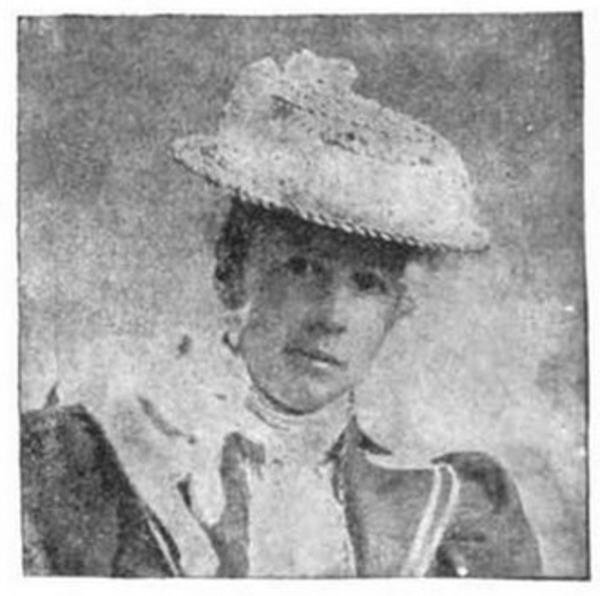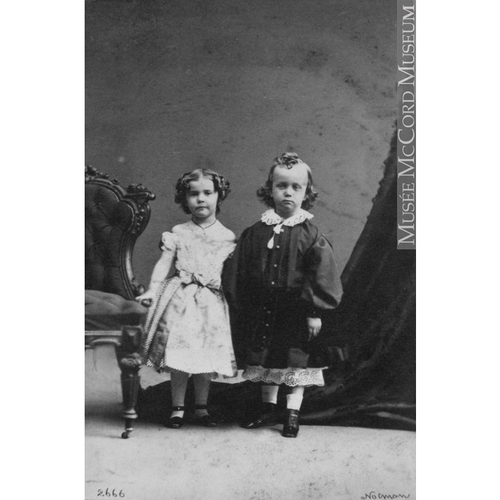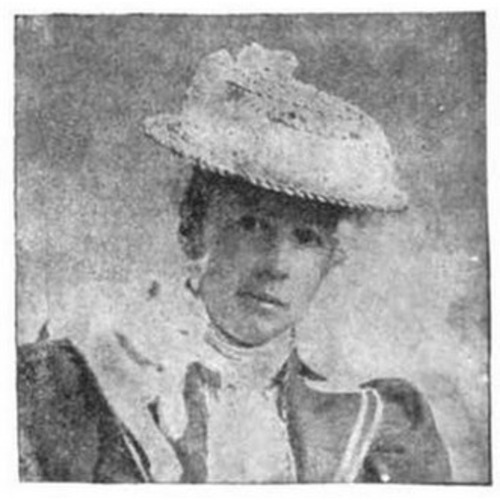
Source: Link
DOUGALL, LILY, author; b. 16 April 1858 in Montreal, youngest of the nine children of John Dougall* and Elizabeth Redpath; granddaughter of John Redpath*; d. unmarried 9 Oct. 1923 in Cumnor, England.
The daughter of a prosperous merchant and founder of religious newspapers, including the Montreal Witness, Lily Dougall received her early education in private schools; afterwards, while living briefly as companion to an aunt in Edinburgh in 1881, she began taking courses at the University of Edinburgh Centre for the Education of Women in preparation for a writing career. About 1885 she enrolled in the University of St Andrews in Scotland and in 1887 she obtained an lla (lady literate in arts), the equivalent to the ma awarded to men. From 1885 to 1900 she divided her time between Great Britain and Canada. After 1900 she decided to make her home in England, largely for health reasons (she suffered from asthma), but she continued to spend extended periods in Canada, for the most part at the Montreal home of her brother John Redpath.
Dougall published her first short story in 1889. Her short fiction would appear in journals such as Temple Bar (London), Atlantic Monthly (Boston), Longman’s Magazine (London), and Chambers’s Journal (London and Edinburgh). Her first novel, Beggars all (London, 1891), was hailed by critics and public alike. Set in England, it entertains with a suspenseful and unusual plot and intriguing characters, while challenging current moral and ethical assumptions, a combination which would continue to characterize her fiction. In the intellectual quality of her writing and her concern with everyday actions she recalls George Eliot. Her second novel, What necessity knows (London, 1893), set in Canada, also received high praise. In its broad scope it resembles Eliot’s Middlemarch . . . (London, 1871–72), but it also has parallels with Jane Austen’s novels, notably Pride and prejudice (London, 1813). A complex novel, written in a style that is witty, richly symbolic, and lyrically descriptive of the Canadian landscape, What necessity knows is multi-layered. It may be read for its love triangles, its portrayal of the social and psychological diversity of British immigrants in the Eastern Townships, its exploration of spiritual regeneration, and its demonstration of the effectiveness of strong, independent-minded women.
Ever the scholar, Dougall made a point of consulting experts. She sent her early stories and novels to Henry Sidgwick, professor of moral philosophy at Cambridge and a founder and first president of the Society for Psychical Research. From her early years Dougall had been intrigued by mental telepathy, spiritualism, faith healing, and the relationship of the spiritual, psychological, and physical worlds and in 1895 she joined the society; she would remain a member for many years.
Dougall’s next three novels are also set in Canada. The most overtly didactic is The Zeit-geist (London, 1895), the story of the conversion of the protagonist from a dissolute life to a deeply spiritual and philanthropic one in which he becomes a freethinker and essentially a pantheist. For this novel, Dougall sought the advice of Oxford philosophers William Wallace and Edward Caird.
In 1899 Dougall published The Mormon prophet (London), a novel about the rise of Mormonism based on research in the archives of the Church of Jesus Christ of Latter-day Saints and interviews with those who had known the church’s founder, Joseph Smith; it was primarily concerned with the complex character of Smith. Dougall met with philosopher and psychologist William James to discuss Smith’s visions, supposed revelations to him, and, in a more general way, mysticism.
Dougall’s first theological work, Pro Christo et ecclesia (London, 1900), published anonymously because of its controversial nature, was hailed by critics as a “work of great power” and its author was thought to be an eminent clergyman. Here Dougall develops the ideas she dramatized in her fiction, urging a renewal of Christianity based on love and joy, criticizing sectarianism, and stressing the necessity that Christianity adapt to new knowledge. Although she published three more novels within the next eight years, she turned to writing religious and philosophical works anonymously. As her identity gradually became known, she was increasingly consulted by other scholars.
After having lived in several places in England, Dougall moved in 1911 to Cumnor, near Oxford, where her home became a centre for philosophical discussion. Contributors to the four collections of essays which came out of these discussions included scholars from a broad array of disciplines. In her own works she explored such issues as the psychological aspects of religious experience, the relationship between religion and science and between religion and art, and the responsibility of churches to be concerned with social issues. She was ecumenical in her attitude to Christianity: she participated in meetings of Christian Scientists and was asked to write for their publication; she was invited to publish in the Unitarian Hibbert Journal (London); she attended the summer school of the Society of Friends and wrote for their monthly journal; and she held a conference on faith healing in her home. The relationship between physical, psychological, and spiritual health developed into one of her main interests. She became an active member of the Guild of Health and wrote a book for its study groups. Increasingly concerned with social and political issues, she attended conferences and meetings on a broad range of issues, including Fabian socialism.
In his text In defence of the faith (Oxford, 1927), an overview of the development of modernism in the Anglican church in the early 20th century, Charles Gardner includes Dougall in his chapter “Some women rebels,” praising Pro Christo et ecclesia. “To those brought up in the old puritan Evangelicalism it was a new gospel. Pharisaism is tracked down and laid relentlessly bare, and a soft light is turned onto the exquisitely human Figure of the gospels.” Commenting on Dougall’s collaboration with the “brilliant” Cyril William Emmet in The Lord of thought . . . (1922), he observes, “Miss Dougall has much to say that is illuminating and stimulating on the apocalyptic problem.” Gardner is intrigued by the remarkable influence Dougall had on contemporary scholars and philosophers, such as Burnett Hillman Streeter, Percy Dearmer, Harold Anson, and on literary critic Arthur Clutton-Brock.
Dougall’s novels were published in both Great Britain and the United States and widely and favourably reviewed, as were her philosophical and religious works. She was an intellectual writer with an enquiring mind who used her skills to challenge the status quo in society and in religion and she was admired by many of the foremost scholars of her day. She died suddenly of heart failure at her home in Cumnor.
Lily Dougall is the author of numerous novels and religious works. A partial list is available in CIHM, Reg. Other works are cited in the catalogue of the National Library of Canada, Ottawa. Some of her correspondence, biographical notes about her, and financial records can be found in the John Dougall and family fonds (NA, MG 29, C34). The Bodleian Library, Univ. of Oxford, Dept of Special Coll. and Western mss, holds additional correspondence, newspaper articles, unpublished manuscripts, business papers, and various biographical materials. Biographical information is also provided in Victoria Walker’s introduction to Dougall’s book What necessity knows (Ottawa, 1992), 7–23.
ANQ-M, CE601-S95, 18 juill. 1858. Mount Royal Cemetery Company (Outremont, Que.), Dougall family memorial marker. Gazette (Montreal), 11 Oct. 1923. Manchester Guardian (Manchester, Eng.), 16 Oct. 1923. Times (London), 11 Oct. 1923. Joanna Dean, “Mysticism and religious modernism: Lily Dougall (1858–1923),” Canadian Soc. of Church Hist., Hist. papers (n.p.), 1996: 57–84. Edinburgh Assoc. for the Univ. Education of Women, Calendar, 1879–82. Charles Gardner, In defence of the faith (Oxford, 1927). Lorraine McMullen, “Lily Dougall: the religious vision of a Canadian novelist,” Studies in Religion (Waterloo, Ont.), 16 (1987): 79–90; “Lily Dougall’s vision of Canada,” in A mazing space: writing Canadian women writing, ed. Shirley Neuman and Smaro Kamboureli (Edmonton, 1986), 137–47. The Oxford companion to Canadian literature, ed. William Troye (Toronto, 1983). R. N. Smart, “Literate ladies – a fifty year experiment,” Alumnus Assoc. of the Univ. of St Andrews, Alumnus Chronicle (St Andrews, Scot.), 59 (June 1968): 21–31. Standard dict. of Canadian biog. (Roberts and Tunnell). B. H. Streeter, In memoriam, Lily Dougall; a sermon preached at Cumnor Church on Sunday evening, October 21, 1923 (Oxford, n.d.).
Cite This Article
Lorraine McMullen, “DOUGALL, LILY,” in Dictionary of Canadian Biography, vol. 15, University of Toronto/Université Laval, 2003–, accessed February 15, 2026, https://www.biographi.ca/en/bio/dougall_lily_15E.html.
The citation above shows the format for footnotes and endnotes according to the Chicago manual of style (16th edition). Information to be used in other citation formats:
| Permalink: | https://www.biographi.ca/en/bio/dougall_lily_15E.html |
| Author of Article: | Lorraine McMullen |
| Title of Article: | DOUGALL, LILY |
| Publication Name: | Dictionary of Canadian Biography, vol. 15 |
| Publisher: | University of Toronto/Université Laval |
| Year of publication: | 2005 |
| Year of revision: | 2005 |
| Access Date: | February 15, 2026 |




